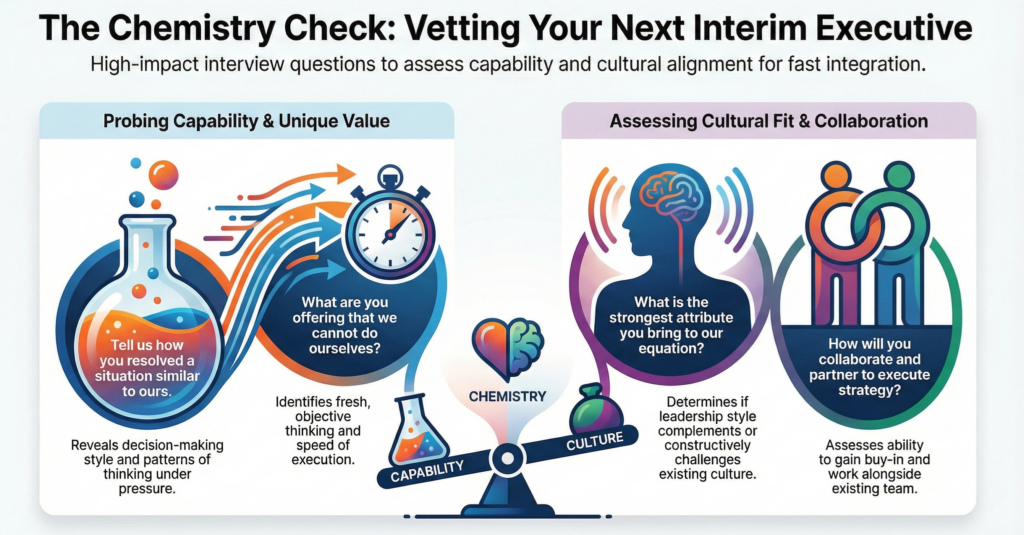At InterimExecs, we’ve spent years developing a proven methodology for matching companies with experienced interim executives. While skills, experience, and track record matter, one factor consistently rises to the top of the list: chemistry.
Whether the interim executive will be working with a private equity fund, a company owner, a board, or an existing management team, alignment and trust are essential. Once we recommend an executive—or team—tailored to a company’s needs, the next question almost always follows:
“What should we be asking in the interview to know if this is truly the right fit?”
Below are several targeted interview questions designed to help you assess both capability and chemistry—so you can move forward with confidence.
1. “Tell us how you resolved a situation similar to ours.”
A tight alignment between an executive’s experience and the organization’s immediate challenges is critical. Career interim executives have typically worked across industries, company sizes, and complex situations.
By asking about parallel experiences—both successes and failures—you gain insight into:
- How the executive approaches problem-solving
- Their decision-making style under pressure
- The tangible value they can deliver in your specific situation
Past performance may not guarantee future results, but it does reveal patterns of thinking and execution.
2. “What are you offering that we cannot do ourselves?”
This question gets to the heart of why organizations engage interim leadership in the first place.
Boards and owners often seek interims to:
- Introduce fresh, objective thinking
- Break through growth barriers
- Address urgent operational or strategic roadblocks
A strong interim executive should clearly articulate what differentiates them, how their experience, perspective, and speed of execution allow them to add value immediately.
Read More: 11 Things to Expect from an Interim Leader During Their First 30 Days on the Job
3. “What is the strongest attribute you bring to our equation?”
Beyond skills and experience, cultural fit matters.
This question helps you assess:
- How the executive will integrate with your existing leadership team
- Whether their leadership style complements—or constructively challenges—your culture
- If they can stabilize, elevate, or reset the corporate climate when necessary
The right interim may reinforce what’s working—or deliberately shake things up to drive results.
4. “How will you collaborate with the board and partner with our team to execute strategy?”
Interim executives are brought in to create impact quickly. They enter engagements to:
- Make focused, high-impact changes
- Execute a clear plan
- Leave the organization stronger than they found it
Their ability to collaborate with the board, gain buy-in from management, and work alongside employees is essential. Just as important: companies must be clear about how much authority they are willing to grant the interim executive to lead effectively.
Remember: The Interview Is a Two-Way Conversation
While companies are evaluating interim executives, the reverse is also true.
Seasoned interims are selective. They listen closely to the questions being asked—and often interpret them as signals of whether the organization is truly ready to support and implement meaningful change.
And finally, when both sides know the fit is right, the most powerful question of the day becomes:
“When can you start?”
Need help identifying and interviewing the right interim executive for your situation? InterimExecs specializes in confidential, high-impact interim leadership placements for private equity firms, boards, and company owners.
👉 Contact InterimExecs today for a confidential conversation about your needs and how the right interim executive can accelerate results.
t?”







